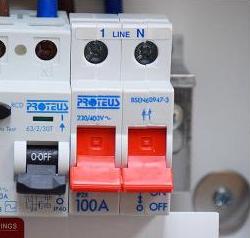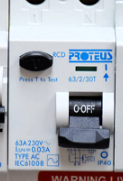Stay safe in your home
Electricity can kill. Electricity is now the major cause of accidental fires in UK homes. Government statistics show that electricity causes more than 20,000 fires a year – almost half of all accidental UK house fires. Each year, about 70 people are killed and 350,000 are seriously injured due to an electrical accident in the home.
Modern living has meant we use more and more electrical appliances in the home. For instance, just 20 years ago the average UK home had a hi-fi system and one TV or video, whereas today it is more likely that there are at least two TVs, a DVD player, a satellite receiver, games console, microwave and computer. So the risk of electrical accidents in the home is much higher than before.
Who should carry out electrical work in my property?
It is important that any electrical installation work is carried out only by people who are competent. This means people who have the knowledge, skills and experience needed to avoid dangers to themselves and others that electricity can create. It’s easy to make an electrical circuit work – it’s far harder to make the circuit work safely.
ElectriciansOnCall are Kent’s premier and most accredited electrical contractors, we have been looking after the electrical safety of clients within all CT postcode areas for over 30 years.
Main Switch
The main switch in the consumer unit (fusebox) allows you to turn off the supply to your electrical installation. Some electrical installations have more than one main switch. For example, if your home is heated by electric storage heaters, you may have a separate consumer unit for them. The consumer unit should be easy to get to, so find out where the main switch is to turn the electricity off in an emergency.

Fuses
Older homes often have rewireable fuses which automatically disconnect (Blow) to prevent danger, these are normally either made from Bakelite or even ceramic, and will have a piece of fuse wire fitted between two terminals or are fitted with a fuse similar to a plug fuse. It’s important to point out that these types of safety devices only protect the circuit and cables and will not protect you from electric shock.

Circuit-breakers
Newer homes, or those rewired within the last 25 years, are likely to have miniature circuit breakers installed. These switch off (Trip) when a fault is detected. Once the fault has been identified and rectified, the circuit breaker can simply be switched back on to restore power to the previously faulty circuit.

Residual current devices (RCD)
An RCD or Residual Current Device is a lifesaving piece of your electrical installation. It is designed to prevent you from receiving a fatal electric shock if you touch something that has become live like a bare wire. It provides a level of protection not offered by fuses or circuit breakers alone. It is now a requirement for all circuits to be protected by a residual current device.

How old is your wiring?
Faulty and aging wiring is one of the major causes of electrical fires in the home. You can avoid these risks by having regular checks carried out on the condition of your cables, switches, sockets and other accessories.
There are clear signs that can help you tell the age of electrical installations in your home. These are:
If you have any of the above still in operation you could be at risk of electrocution or fire. Contact your local office today and arrange an electrical installation condition report. This will identify any potential dangers within your installation.
8 signs your house might require rewiring
© ElectriciansOnCall | SLA | Terms of Business | Site by Arctic Bee